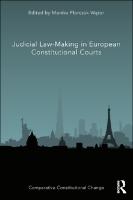Judicial Law-Making in European Constitutional Courts
Proposal review
Contributor(s)
Florczak-Wątor, Monika (editor)
Language
EnglishAbstract
This book analyses the specificity of the law-making activity of European constitutional courts. The main hypothesis is that currently constitutional courts are positive legislators whose position in the system of State organs needs to be redefined. The book covers the analysis of the law-making activity of four constitutional courts in Western countries: Germany, Italy, Spain, and France; and six constitutional courts in Central–East European countries: Poland, Hungary, the Czech Republic, Slovak Republic, Latvia, and Bulgaria; as well as two international courts: the European Court of Human Rights (ECtHR) and the Court of Justice of the European Union (CJEU). The work thus identifies the mutual interactions between national constitutional courts and international tribunals in terms of their law-making activity. The chosen countries include constitutional courts which have been recently captured by populist governments and subordinated to political powers. Therefore, one of the purposes of the book is to identify the change in the law-making activity of those courts and to compare it with the activity of constitutional courts from countries in which democracy is not viewed as being under threat. Written by national experts, each chapter addresses a series of set questions allowing accessible and meaningful comparison. The book will be a valuable resource for students, academics, and policy-makers working in the areas of constitutional law and politics.
Keywords
constitutional courts; constitutional interpretation; democracy; judicial activism; judicial law-making; judicial review; positive legislation; separation of powersDOI
10.4324/9781003022442ISBN
9781000062199, 9781003022442, 9781032187990, 9780367900755, 9781000062199Publisher
Taylor & FrancisPublisher website
https://taylorandfrancis.com/Publication date and place
2020Imprint
RoutledgeSeries
Comparative Constitutional Change,Classification
Jurisprudence and general issues
Constitutional and administrative law: general
Law: Human rights and civil liberties
Comparative law
Legal systems: courts and procedures
Laws of specific jurisdictions and specific areas of law
Government powers
Legal systems: judges and judicial powers
Comparative politics
Public international law: treaties and other sources
Constitution: government and the state
Human rights, civil rights
Central / national / federal government
International institutions


 Download
Download